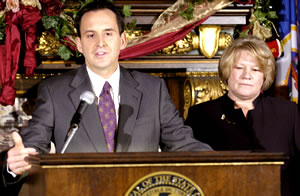 |
|
Graphic by Mordechai Dorfman |
A far-reaching funding package that would create a $7.15 billion state investment for highway and transit programs during a 10-year period was proposed by the Pawlenty-Molnau Administration Dec. 22 to meet Minnesota’s ever-increasing transportation needs.
The plan is the most comprehensive one ever proposed by a Minnesota governor.
The administration calls for an amendment to the Minnesota Constitution that would dedicate all the revenue generated by the sales tax on motor vehicles (known as MVST) to highway and transit projects and a $4.5 billion bonding package to accelerate highway construction projects that have been delayed or unfunded for several years.
“Transportation is a vital link to Minnesota’s future,” Gov. Tim Pawlenty said. “Now is the time to take bold, historic steps to ensure that we have a transportation system that serves Minnesota well into the 21st century.”
The administration estimates that the MVST would generate about $2.65 billion during a 10-year period.
Currently, MVST revenues are deposited in the state’s General Fund. Of those funds, no more than 54 percent can be used for highway and transit purposes.
As proposed, 60 percent of MVST funds would go for state highways and local roads. The remaining 40 percent would fund transit projects in the Twin Cities metro area and Greater Minnesota.
Funding from the MVST dedication proposal would assist in moving forward on construction of major transitway corridors in the Twin Cities metro area such as Northstar Commuter Rail, Northwest Corridor, Cedar Avenue Corridor, Central Corridor and bus rapid transit on Interstate 35W.
 |
“Now is the time to take bold, historic steps to ensure that we have a transportation system that serves Minnesota well into the 21st century,” Gov. Tim Pawlenty said as he and Lt. Gov. Carol Molnau announced their funding proposal at a Dec. 22 Capitol news conference. Photo by David Gonzalez |
“It has long been recognized that MVST revenues should be part of the permanent, dedicated stream of funding for roads and transit,” said Lt. Gov./Commissioner Carol Molnau. “State gas taxes and auto license fees have been constitutionally dedicated to transportation. After years of talk, this plan finally puts those revenues where they belong—permanently.”
The bonding proposal would accelerate construction of major highway projects that would reduce congestion, improve capacity, remove bottlenecks and improve mobility on the state’s interregional corridors.
Pawlenty said dedicating the MVST funds would provide more than $2.65 billion in new revenues for transportation through fiscal year 2017: $1 billion for Twin Cities metro area transit, $950 million for state highways, $580 million for city and county roads, $40 million for Greater Minnesota transit services, and $80 million for the “five percent fund,” the constitutionally dedicated portion of the highway user tax distribution fund that’s set aside for legislative appropriation.
If approved by the Legislature, the MVST constitutional amendment would appear on statewide election ballots in 2006. If passed by the state’s voters, the funding shift would be phased in during a five-year period, starting with the current statutory levels.
If it wins legislative approval, the 10-year bonding package would enable Mn/DOT to address long-delayed transportation needs.
The bonds would be paid off by dedicating less than 50 percent of projected growth over 2005 levels in gas tax revenue, vehicle registration fees and federal funds for trunk highways through fiscal year 2038.
“Bonding makes sense and is fiscally responsible,” said Molnau. “To equal the financial benefit gained by bonding we would need to raise the gas tax by 20 cents – and that is just not practical.”
For more information, see the Pawlenty/Molnau 2005 Transportation Investment Package Web site.
|



